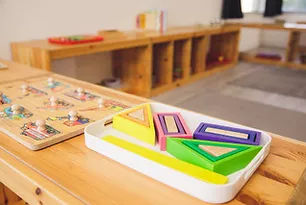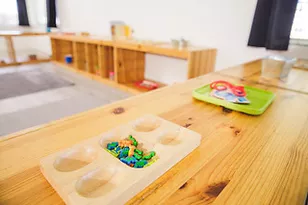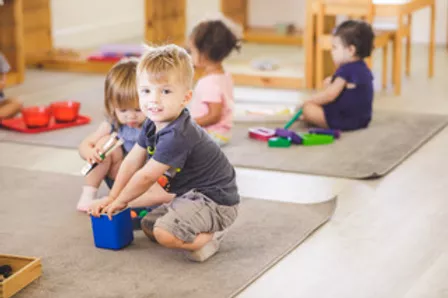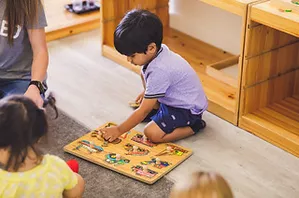Sunrise Montessori SchoolToddlerWe provide education encompassing the social, emotional, intellectual, and physical growth of each child.
Our SchoolThe Montessori Toddler Classroom
Children of this age are experiencing the final months of the unconscious absorbent mind – no sensory censoring with toddlers!! They are strongly sensitive to movement, order, and the development of language. As infants, we hope that they experienced strong attachments with loving and respectful others, but we also know that a toddler is learning to be separate, to recognize their own person-hood. A good program will understand and support a toddler’s needs, and a good teacher knows that unnecessary help is actually a hindrance.
Your children deserve teachers who are caring and patient. They deserve teachers who observe them, who come to know them and discern their interests. Your children deserve a program that provides them with opportunities for different kinds of purposeful movement – inside and out, fine and gross, graceful, reaching, challenging, and self-directed. Through movement, they develop their central nervous systems, their very brains, and their mind-body discipline. Children need to develop sufficient coordination to express their will. They deserve a prepared environment that will support and appeal to their need for order, for consistency, ritual, predictability, sequence; this order supports their child’s ability to think.
Finally, children deserve an environment rich with opportunity to develop language. We sing, read, and constantly name the environment. We listen. We remember Maria Montessori’s concept of the three period lesson:
- Naming (This is…)
- Recognition (Give me…)
- Pronunciation by the child (What is this?)
The daily schedule of a toddler is:
- Gather with music
- Work in the prepared environment
- Briefly sing together, read a book
- Briefly play outside
- Eat snack together
We try to remember that true learning occurs when the child is ready to learn, not necessarily when the adult is ready to teach; that children absorb what we do, our attitudes and intentions, even more than what we say; that children deserve language – precise and descriptive – rather than applause; that we should avoid interfering with concentration, but seize the moment to redirect when concentration ends.
And not least, we are continually awed by the growth – cognitive, emotional, physical – that toddler’s experience. What a privilege to observe and to help guide children of this age!




